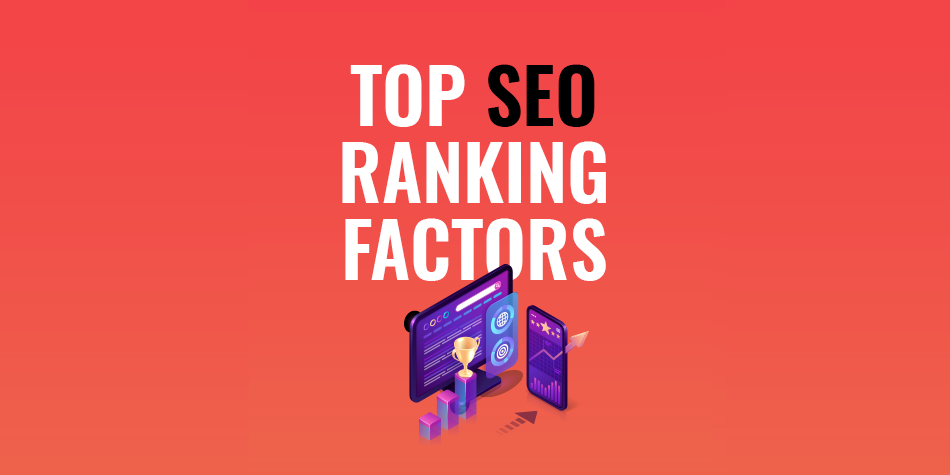
5 important SEO ranking factors
An SEO (search engine optimisation) strategy is a vital part of your company’s online success but with over 200 ranking factors on Google alone, this can become very overwhelming. This is doubly so when you consider that search engines constantly change ranking factors and how much each one is worth.
Fortunately, some SEO ranking factors have consistently stayed strong and can become key tools in your strategy. In this article, we will go over five of those ranking factors that you need to take advantage of.
What are SEO ranking factors?
Search engines provide their users with an incredibly long list of search results when a search is made. It can very often span several pages, but these results are not randomised. Search engines crawl through every single web page that could match the search and ranks them to relevancy, authority and security.
Search engines like Google want to provide results that will best satisfy their users. To determine this, they have ranking factors that they use to determine the order in which websites will appear first. Getting Google to rank your website on the first page is incredibly important to gain organic online traffic.
You can test how important this is for yourself because chances are, you use search engines. Think, when was the last time you actually went to the second page after a search. We would bet on you saying never or hardly ever because 95% of all Google traffic doesn’t either.
If you want to rank on Google, you will need to use the SEO ranking factors to climb up the SERP (search engine results page).
5 important SEO ranking factors to add to your strategy.
To increase your websites organic traffic through search engines, you need to boost your SEO ranking factors. But what are these factors? Here are our top five that you need to add to your strategy:
- Keyword optimization.
- Backlinks.
- User search intent.
- Mobile-friendly design.
- Page load speed.
Keyword optimization.
Search engines use keywords to understand what your webpage is about and how much it relates to a person’s search. To know what keywords you want to rank for on your website, you will need to do thorough keyword research. To get you started, read our article: How to do keyword research for your website.
When you know what keywords you want to use, you are going to want to use them on the webpage you want to rank on. Use them throughout the page and the headline but don’t stuff it into every sentence. The most important part of SEO how much people want to read your content or find out about your product or service. Keyword stuffing will chase them away and chase Google away.
Backlinks.
Links from third-party websites to one of your pages is a backlink. You want each of your pages to have a few high-quality backlinks to really be competitive. Take note of the word high-quality. You do not want backlinks from spam websites.
The backlinks your get should focus on quality over quantity. Search engines love backlinks from websites that have high authority and are industry related. When Google sees this, it will think your website is a reputable one that it can definitely show to its users.
Getting backlinks from reputable and authoritative websites can be an overwhelming task, but you can start simple. Contacting writers from industry blogs and being the first to link to other websites is a great place to start.
User search intent.
Search engines have one goal, to show the most related websites to a search. To move up the SERP, your website’s pages need to answer the intent behind the search queries. If your website was ranking for a keyword that it doesn’t provide an answer to, Google will realise that and rank you lower.
Getting this ranking factor will also help you understand where your visitors are in their buyer journey. Are they looking for a solution to a problem or are they looking for more information on your product or service? This information can help aid your online marketing strategy.
Mobile-friendly design.
Around 50% of all internet traffic is through mobile devices and your clients are no exception. Mobile devices all have different screen sizes which is why responsive design is so important. If your website is not responsive, you could be chasing away most of your potential clients.
Google also ranks sites based on how mobile-friendly it is. This is a very strong ranking factor that you will need to take advantage of to climb the SERP.
Page load speed.
The amount of time your website takes to load is a factor that comes up a lot when discussing website best practises. It’s important for UX, bounce rate and also SEO ranking factors.
We don’t want to wait forever for a page to load and many of your clients will not want to wait for more than two seconds. Search engines don’t like to wait either. By making your website load faster, you will reduce your bounce rate, keep your organic traffic engaged and rank higher for it all.
Let Web2Web help you improve your website’s SEO rank.
Search engine optimisation is important for the online success of your business. If you are struggling with how you can best improve your SERP rankings on Google, then get in touch with Web2Web.
Our team of experts can help with optimizing every page on your website with every ranking factor we have mentioned above and more. We will be with you every step of the way of making your website more successful online.

 021 551 2060
021 551 2060



